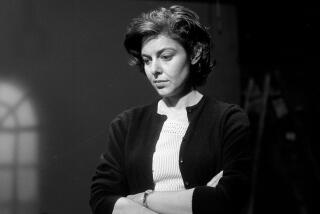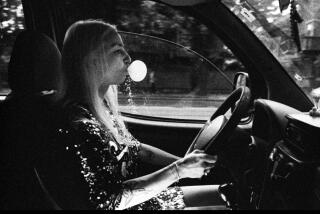The days of avocados
- Share via
“I’ll tell you how it feels to be an overnight success at 86,” said the author Elaine Dundy over the telephone, laughing. She was inviting me to visit her at her Park La Brea home to talk about the recent New York Review Books reissue of her beloved 1958 proto-chick-lit novel, “The Dud Avocado.” Told from the perspective of Sally Jay Gorce, a sassy 21-year-old American on a Parisian (mis)adventure funded by her rich uncle, the book was a bestseller when it was published and received praise from such luminaries as Ernest Hemingway and Groucho Marx, who wrote to Dundy, “If this was actually your life, I don’t know how the hell you got through it.”
Besides “The Dud Avocado,” which until the new edition had been out of print in the U.S. since the ‘60s (it’s never been out of print in England, however), Dundy is best known for the 1985 biography “Elvis and Gladys” and for her celebrated and rocky marriage to the British theater critic Kenneth Tynan, which she described in occasionally sordid detail in her 2001 autobiography, “Life Itself!” (he enjoyed, among other things, flagellating his wife with a headmaster’s cane).
It was Tynan who suggested that Dundy, then an actress, should try writing a novel, prompted by the funny, conversational tone of her letters. (It was also he who suggested that “The Dud Avocado” would make a great book title, which may not have been quite as solid advice.) Today, Dundy credits the optimistic era and the illustrious company she and Tynan kept, socializing at London’s Buxton Club, with giving her the confidence to actually write the book.
“What you have to think about,” she said a week later, dressed in a pink-and-red dress and sipping Dr. Pepper in the living room of the Park La Brea apartment where she now lives after 15 years at the Chateau Marmont, “is Roger Bannister, who broke the four-minute mile. And guess what? Lots of people did it afterwards. I’m sitting with all these people doing this, so I can too.”
The story begins (like another “girl gone wild” tale published that same year, “Breakfast at Tiffany’s”) with our heroine taking a morning stroll in her evening gown. “I knew enough about writing to know that you start in the middle of things,” said Dundy. We meet Sally Jay on the Champs Élysées, heading for a rendezvous with her married Italian lover when she encounters and instantly falls for an old acquaintance -- a handsome American actor and director named Larry, who pokes fun at her pinkish red hair and gives her an orgasm just by holding her hand. It’s a detail that, according to the politically liberal author, always gets brushed aside by the press.
“Nobody has every talked about Sally Jay coming,” she said, pointedly looking me in the eye. “I find that interesting that they don’t.” We were seated very close to each other so that Dundy, who suffers from macular degeneration, could see my face instead of just an outline. Lest there be any confusion, she also gave me the exact page number of the scene, explaining, “That’s really what holds Sally Jay [to Larry] for a very long time. It’s completely sexual.”
If this doesn’t sound like standard ‘50s fare, that might partly explain “The Dud Avocado’s” relative obscurity in America, but Dundy wasn’t trying to shock. In fact, she told me, she was uncomfortable with the cover design of the new edition, which features a lounging nude woman whose bottom is covered by the book title. “I wanted something like this,” she pointed to the slightly artsy author’s photograph on the back of the book, taken in Paris in 1950. Sally Jay, however, whirling through bohemian Paris, would be just fine with the nude photograph; she actually poses for a young painter in the story, requiring only his talent for justification.
As Dundy recalled, when she got stuck during the writing process she would ask herself, “What would I not do?” And that’s what Sally Jay would do next. “I learned an awful lot,” she said.
Because Sally Jay is allowed to experience life unencumbered by American “values,” she’s a surprisingly modern heroine. Her exploits, at times blundering and foolhardy -- for instance, trying to make a lover jealous by dancing with a man she refers to as “Crazy Eyes,” who’d “hit your head on a stone fireplace if he felt like it” -- are confessed with droll humor and no remorse. “The Dud Avocado” sparkles with the naive exuberance of a real (albeit well-educated and articulate) 21-year-old on her own in Europe for the first time. Luckily for the reader, she stumbles into some illuminating and often illicit scenes in Paris’ cultural underground, rubbing elbows (and more) with transvestites, a contessa, a pimp and a host of starving artists, writers and actors.
Already singled out in O the Oprah Magazine and named an Amazon.com “mover and shaker,” this edition will, Dundy hopes, introduce a new readership to the unforgettable Sally Jay Gorce, described by one reviewer as a cross between Carrie Bradshaw and Holden Caulfield. Dundy, for one, prefers comparisons to Bridget Jones. “I think she’s adorable,” she said, admitting she’d only seen the Bridget Jones movies. “Better the second than the first,” she asserted. “By then she’s arrived.”
And now, the movie version
Soon, Sally Jay should be arriving on the big screen as well. Sara Risher, a former New Line executive who now heads a production company called Chick Flicks, has successfully negotiated the rights to “The Dud Avocado” with 20th Century Fox, which acquired them in perpetuity when it was first published.
A longtime fan of Dundy’s “wicked, wild sense of humor” and now a friend who attended the author’s 86th birthday party this summer along with Gore Vidal and Gloria Vanderbilt, Risher has already raised half the money.
Dundy and director Blake Edwards had lunch together almost 50 years ago to discuss working on the film, but he was committed to another movie at the time: “Breakfast at Tiffany’s.” Risher believes 2007 is a better moment for “The Dud Avocado” anyway, and it is exciting to imagine a free-spirited late-’50s girl viewed through a contemporary, nonjudgmental lens. The producer sees someone like Natalie Portman or “a younger Claire Danes” in the role of Sally Jay Gorce and intends to keep the first-person narration and the period setting. “People were telling me they loved the book but they wanted to update it. I always thought that was wrong.” The period, she noted, explains Sally Jay’s naivete. She added that Montreal, where one of the investors is from, could easily stand in for 1958 Paris.
Most important, Risher isn’t willing to waste any time. “Elaine just wants to see the movie made while she’s still with us,” she said. “And now that’s my goal too.”
More to Read
Sign up for our Book Club newsletter
Get the latest news, events and more from the Los Angeles Times Book Club, and help us get L.A. reading and talking.
You may occasionally receive promotional content from the Los Angeles Times.










